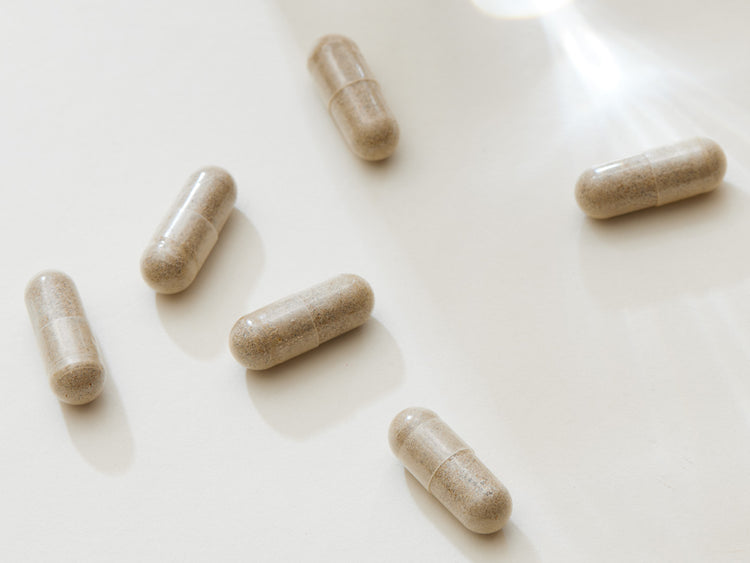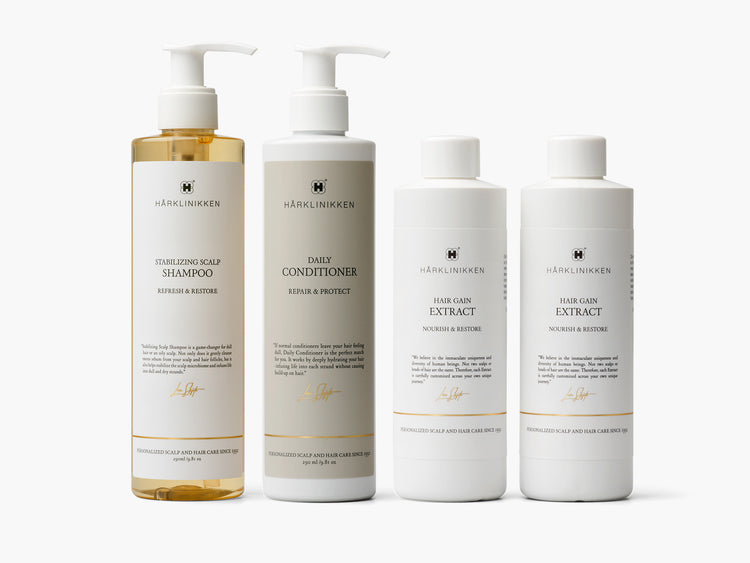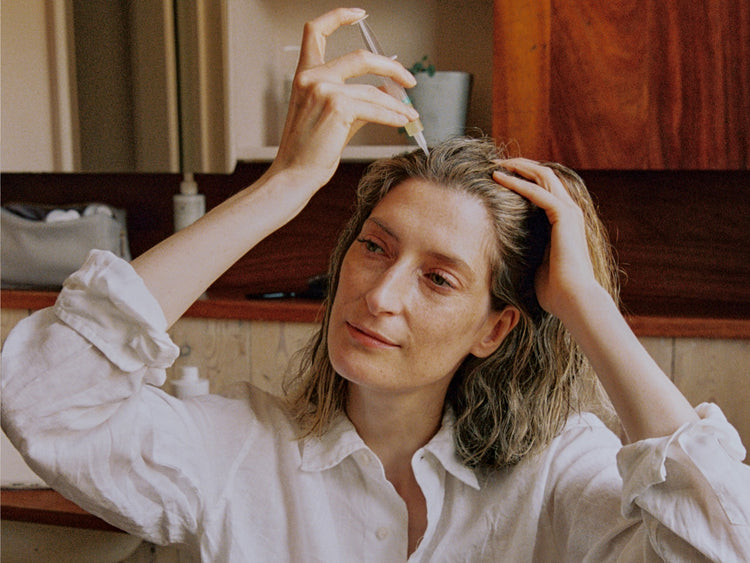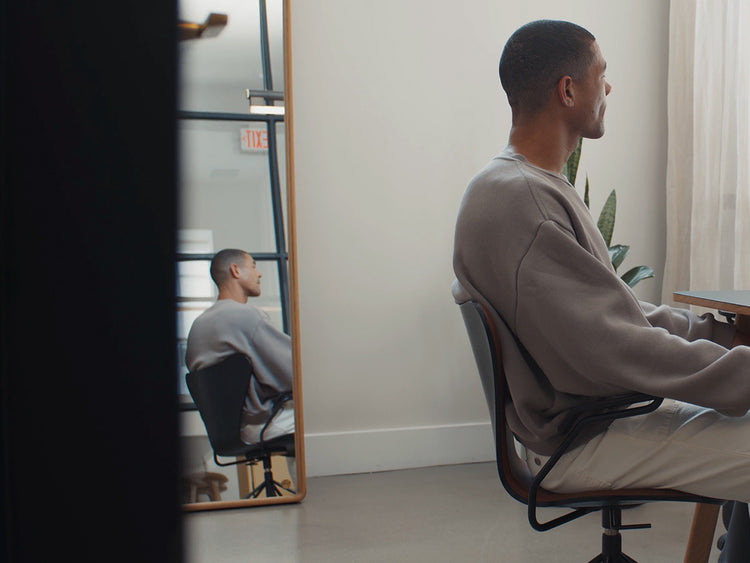Washing your hair seems like an extraordinarily simple ritual, but there’s a lot of conflicting information bubbling around the internet making it difficult to commit to a technique, frequency, or product. At Hårklinikken, we have 30 years of experience and research behind us, so our Hair Specialists are true experts on the matter. To find out the most beneficial method for cleansing your scalp and hair, and to debunk some myths, we spoke with NYC Clinic Director, Sarah Mardis.
How often should I wash my hair and scalp?
“The myth that less cleansing or washing is more beneficial probably came from the fact that you shouldn’t wash the lengths of your hair all that often,” explains Mardis. “But your scalp is different.” Cleansing your scalp every day or every other day is ideal if you’re using a gentle yet effective shampoo like Hårklinikken's. But if you use shampoos with harsh ingredients (like those including some specific sulphates), you could end up irritating your scalp and disrupting your hair growth cycle. In general, it’s important to think about your scalp the way you think about the rest of your skin. That means frequent cleansing with gentle but effective products.
When cleansing, should I focus on my hair or my scalp or both?
“We know that healthy hair starts with a healthy scalp,” Mardis says. “So, when cleansing, it’s your scalp you want to focus on.” The lather and excess shampoo will wash through your hair lengths, so there’s no need to work shampoo into your strands.
Should I shampoo twice, repeating the cleanse?
Double shampooing isn’t typically recommended or necessary if you’re using the right kind of product. "Some products on the market today contain ingredients like silicones, waxes and oils. So ultimately what they're doing is leaving layers of product on the scalp and hair, which is why you might not achieve that clean feeling,” Mardis explains.
What is the best water temperature to wash hair?
Just like when you cleanse your face, avoiding super-hot water is best. Heat can cause irritation and inflammation, so it’s best to opt for warm to lukewarm when shampooing.
How can I tell if I’m over-washing my hair and scalp?
Not many products provide the gentle cleanse and treatment that Hårklinikken's do. Daily use of other shampoos might leave your hair dull, brittle or frizzy and your scalp feeling tight and dry.
What’s the most important thing to remember when cleansing your scalp?
When it comes to gaining stronger and more lustrous hair, it’s crucial to work toward a healthier scalp environment. “You could be speeding up hair loss by not taking care of your scalp in the right way or with the right products,” Mardis says. “It’s super-important to have a scalp-first approach and make sure the foundation is set before we do anything else."
Hårklinikken's Step-by-Step Guide to Correctly Cleansing Your Scalp
Step One: Wet Hair
Thoroughly wet your hair with warm to lukewarm water from scalp to ends.
Step Two: Apply Conditioner First (Optional)
If you have hair that’s shoulder-length or longer, you should apply conditioner first. Work a few pumps of conditioner into the lengths of your wet hair – from about your ears down. Leave it to penetrate your strands while you move to the next step.
Step Three: Emulsify
Take a couple of pumps of shampoo and work it between your fingers to emulsify.
Step Four: Massage Product Into Scalp
Place your fingertips underneath your hair, rather than on top of your head. Massage the emulsified shampoo (don’t neglect the back or crown) into your entire scalp. Be sure to knead with your fingertips rather than rub or scratch using your fingernails. This should take about 30 seconds.
Step Five: Rinse
Thoroughly rinse shampoo (and conditioner) off your scalp and hair. Squeeze hair with your hands gently but firmly to remove excess water before moving on to next steps for drying and styling.
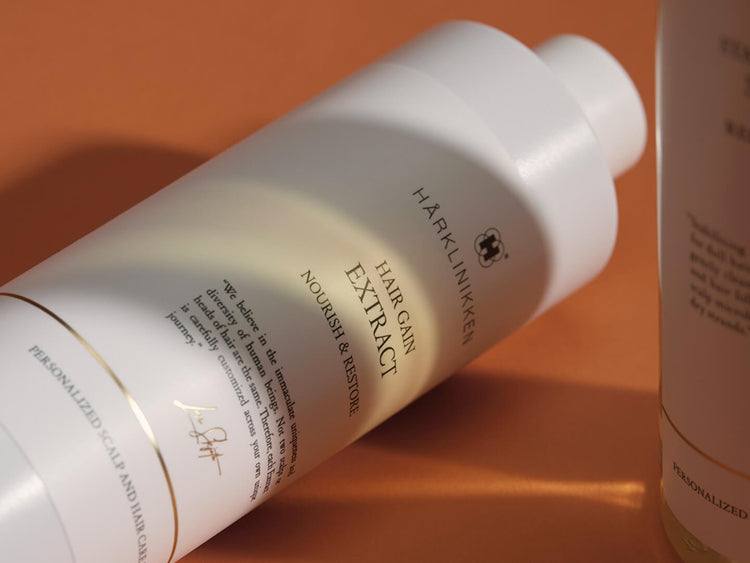
Unsure where to start?
We only accept candidates who we believe we can help, which is why our online Hair Assessment is the best place to start. Based on your results, you will either qualify for immediate treatment or we will organize a consultation.
